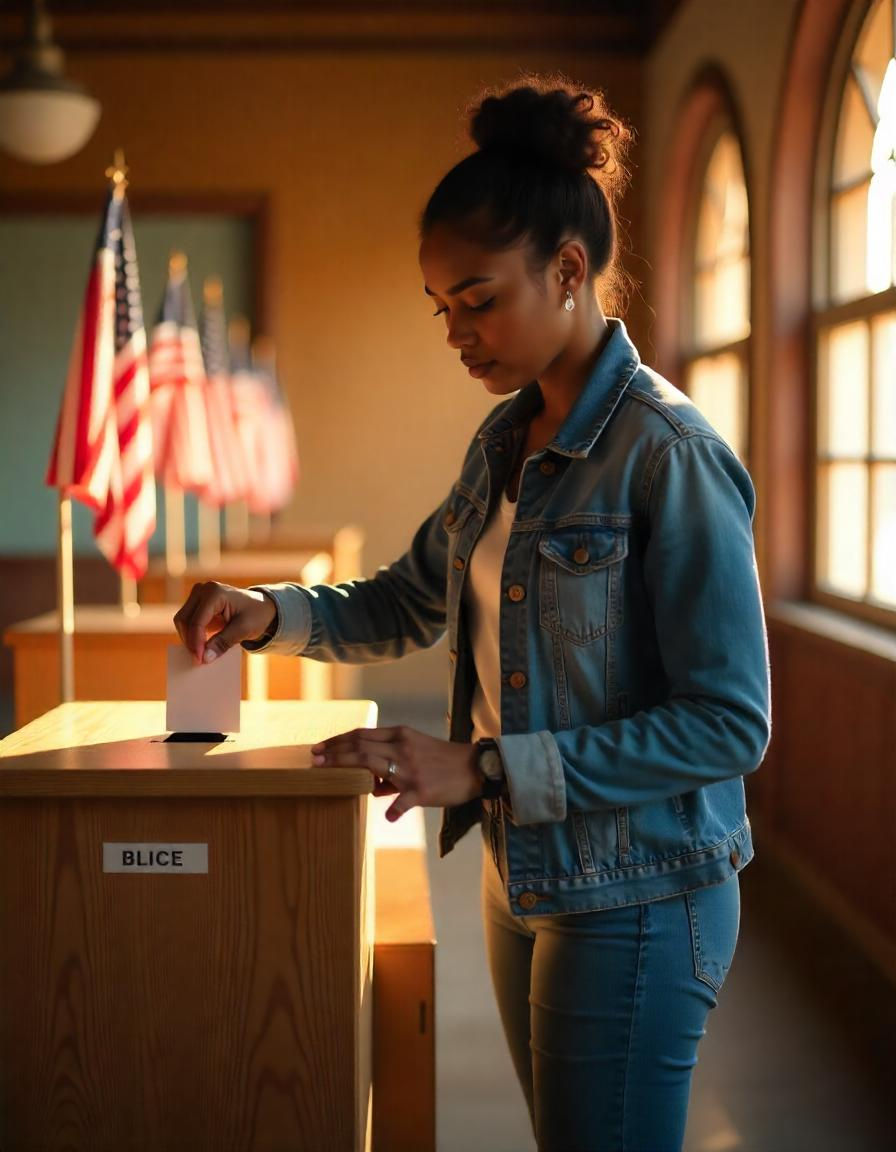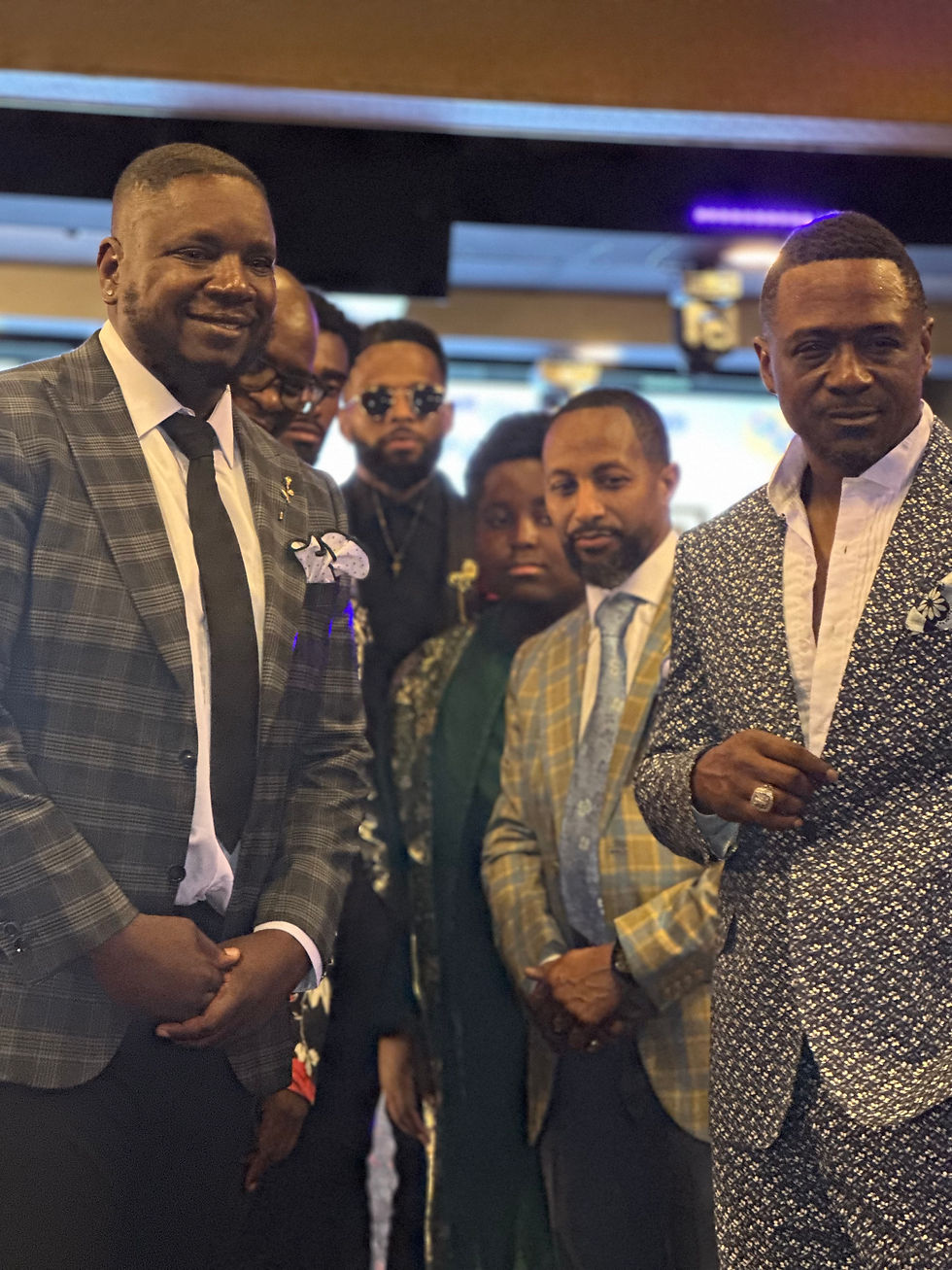When Election Season Feels Like a Championship Fight: The Role of Content Creators in Shaping Voter Engagement
- Sambaza Podcast
- Aug 1
- 7 min read
Updated: 7 days ago

As election season approaches, the political arena becomes more than just a series of events—it transforms into a captivating spectacle. Much like a high-stakes boxing match, where two powerful contenders face off in the ring, American elections become a clash between political parties fighting for dominance. The intensity of the competition and the stakes involved make it feel as though the entire country is on the edge of its seat, waiting for the outcome.
But there's more to this political fight than meets the eye. The presence of the Electoral College introduces another layer to the game, creating a unique and strategic element that both candidates and voters must carefully navigate. As in any championship bout, the way each side strategizes and approaches the contest can tip the balance in their favor—sometimes in unexpected ways.
A New Way to Engage: Election Coverage as a Spectator Sport
In the world of political journalism and content creation, there are those who have chosen to elevate the discourse, not by simply presenting facts, but by crafting relatable, engaging narratives. These storytellers know that elections are not just about the candidates—they’re about the people who vote, the scenarios that unfold, and the dramatic possibilities that lie ahead. By taking a creative, sports-like approach, they turn the election into a game that everyone can be a part of.
Visual aids like electoral maps are among the most powerful tools used in this transformation. They allow content creators to illustrate which states are up for grabs, helping viewers visualize the path to victory for each candidate. These maps are not just about numbers; they offer a lens through which audiences can see how various scenarios might play out. The use of colorful graphics, animated state-by-state breakdowns, and potential outcome simulations opens up a world of possibilities. Viewers are encouraged to think outside the box, considering even the most improbable outcomes and embracing the unpredictability of the political race.
For voters, this approach offers a new perspective: They are no longer passive observers, but active participants in the electoral drama. They are the fans in the stands, experiencing the highs and lows of the contest firsthand. This shift in perspective makes elections feel more like an event that matters to them, imbuing the process with a sense of excitement and ownership. And much like sports fans, they are now emotionally invested in the outcome.
The Responsibilities of Analysts and Content Creators
But while it's easy to get swept up in the fervor of election season, there’s a significant responsibility that comes with creating election content. Analysts and journalists are not just telling stories—they are shaping the narrative. The stakes are high, and the impact of their coverage can influence voter perception, engagement, and ultimately, turnout.
In this context, impartiality becomes crucial. A journalist’s role is not to advocate for one side, but to present both candidates fairly, highlighting their policies and vision without bias. It's essential for media outlets to feature analysts and pundits from across the political spectrum, offering a variety of perspectives that contribute to a well-rounded conversation. This allows voters to make informed decisions based on diverse viewpoints, rather than feeling boxed into a single narrative.
However, the reality in many modern newsrooms is far from ideal. It's no secret that media organizations often have political leanings, and this bias sometimes seeps into their coverage of elections. Whether it's through the framing of issues, the selection of topics, or the tone of reporting, many outlets unintentionally (or intentionally) favor one side over the other. This creates a distorted picture of the race, leading to a skewed portrayal of events.
Finding Balance in Election Coverage
The challenge, then, is to balance the excitement of the race with the responsibility of providing fair, engaging, and informative content. In my opinion, the goal should be to generate as much content as possible, while always being mindful of the audience's demographic. The stories shared must resonate with viewers in a meaningful way, connecting with their concerns, hopes, and aspirations.
When balance is absent, however, the narratives risk becoming less effective. A polarized, one-sided presentation can create misconceptions about the candidates, their platforms, and the election itself. It can also lead to voter disillusionment, as individuals may feel alienated by coverage that doesn’t reflect their own views or experiences. In this sense, election coverage has a much deeper role to play than simply reporting the news—it has the potential to shape how people view their participation in the democratic process.
Empowering the Electorate Through Engaging Dialogue
By fostering a fair, constructive, and inclusive dialogue around elections, content creators can empower voters. They help the electorate navigate the complexities of the political landscape, offering both clarity and nuance in a world often filled with noise and confusion. When done right, election coverage can inspire participation, encourage thoughtful reflection, and enhance the democratic process as a whole.
Ultimately, elections are about more than just picking a winner—they are about ensuring that everyone has a chance to have their voice heard. By approaching this season with the same enthusiasm and strategic thinking as a championship sporting event, we can create a political atmosphere that excites, informs, and unites.
I can imagine some people might be a bit frustrated as they read this article and my comparisons. But I want to remind everyone that these are just my thoughts! I'm more than happy to engage in a friendly conversation and hear your perspectives on what I think. So, let’s explore the possibility of some resistance from my fellow keyboard warriors. Here’s what I'm assuming about you…
Counter Arguments
While framing elections as a thrilling spectacle can certainly engage and empower voters, there are valid concerns about the potential drawbacks of this approach. Here are a few counterarguments to consider:
1. Could Viewing Elections as a Sport Trivialize the Serious Consequences of Political Decisions and Voter Participation?
One might argue that treating elections as a high-stakes contest, much like a sporting event, risks undermining the seriousness of the political process. Politics is, at its core, about making decisions that impact people's lives—whether it's healthcare, education, or national security. By focusing too heavily on the drama and competition, we may inadvertently reduce the importance of these decisions to mere entertainment. The stakes of governance are not just the outcome of a game, but the real-world consequences of policies enacted by those in power.
By oversimplifying the election process and portraying it as a game, there's a risk that voters could become disengaged from the substance of the candidates’ platforms. Instead of focusing on the policies, qualifications, and long-term impact of political decisions, they might become more focused on the "game" of winning and losing, further alienating those who feel their concerns aren't reflected in the spectacle.
2. What About the Commercialization of Elections and Voter Apathy?
Another important concern is the commercialization of elections, which often comes hand in hand with media sensationalism. Critics argue that the increasing reliance on marketing strategies, advertisements, and polling data distorts the essence of democracy. When political candidates are packaged like products, elections can seem less about public service and more about consumerism—creating a marketplace of ideas rather than a forum for meaningful debate.
By framing elections as entertainment or as a "spectacle," it risks detaching voters from the real issues at hand, contributing to voter apathy. Voters may feel as though their participation is a mere transaction rather than a civic duty. Commercialization also raises the issue of money in politics—where those with greater financial resources often have more influence, making it difficult for underrepresented voices to have an equal say.
In this environment, some may argue that citizens become less invested in the process, feeling like their vote is just another product being sold in the marketplace of ideas. This could further contribute to a decline in voter turnout, particularly among younger or disenfranchised voters who feel disconnected from the spectacle of elections.
3. Could Treating Electoral Outcomes as a Spectacle Promote Sensationalism at the Expense of Informed Public Discourse?
There is also the concern that focusing too much on the "show" of elections could lead to sensationalism in media coverage. Political races are often reduced to soundbites, quick headlines, and heated debates, which may overshadow in-depth, fact-based reporting. By centering coverage around dramatic moments and personality clashes, important issues such as healthcare policy, economic strategy, or international relations might take a backseat.
In this environment, voters may struggle to differentiate between substance and style, making it harder to make informed decisions based on the true qualities of the candidates. The rise of clickbait headlines, partisan coverage, and focus on "who's winning" instead of "what's best for the country" could dilute the quality of political discourse, leading to more polarized, less substantive public debates. This can harm the electorate's ability to have thoughtful discussions and make decisions grounded in facts and real-world implications.
Conclusion: Finding a Balance.
While the metaphor of elections as a sport can certainly bring excitement and engagement, it’s essential to strike a balance. The goal should be to engage voters without oversimplifying the process or reducing the gravity of their choices. The commercialized spectacle of elections should not overshadow the importance of informed, policy-driven discourse. Instead of turning elections into a game of winners and losers, we must remind ourselves that this is about real lives and decisions that will impact the future.
By addressing these concerns thoughtfully, we can ensure that election season remains an event that both excites and informs the electorate, empowering citizens to participate in a meaningful way while respecting the seriousness of the democratic process.
CITATIONS
Harvard Gazette Article: Harvard Gazette. (2024, November). The reality of elections vs. election night theater: Media's role in shaping perceptions. Harvard Gazette. https://news.harvard.edu/gazette/story/2024/11/reality-of-elections-vs-election-night-theater-media/Rutgers News Article: Rutgers University. (2024, November). How media – namely news, ads, and social posts – can shape an election. Rutgers News. https://www.rutgers.edu/news/how-media-namely-news-ads-and-social-posts-can-shape-election
Disclaimer: I like to think of myself as both smart and a bit lazy! With the help of AI tools, creating my posts has become much easier and more enjoyable. That said, I’ve still done my research and shared my thoughts in my own way. Technology has made it simple to present my ideas clearly, helping you to easily read and understand them without any tricky jargon or expressions.

Sambaza, a Kenyan immigrant, is deeply passionate about podcasting and public speaking. As he delves into the art of podcasting and explores its many facets, he draws on his experiences as a diasporan and Pan-Africanist to create unique content. His dedication has earned him three nominations for Diasporan Podcaster of the Year among others. Additionally, Sambaza actively collaborates with other podcasters and collectives, continuously enhancing his skills as a creator.



Comments